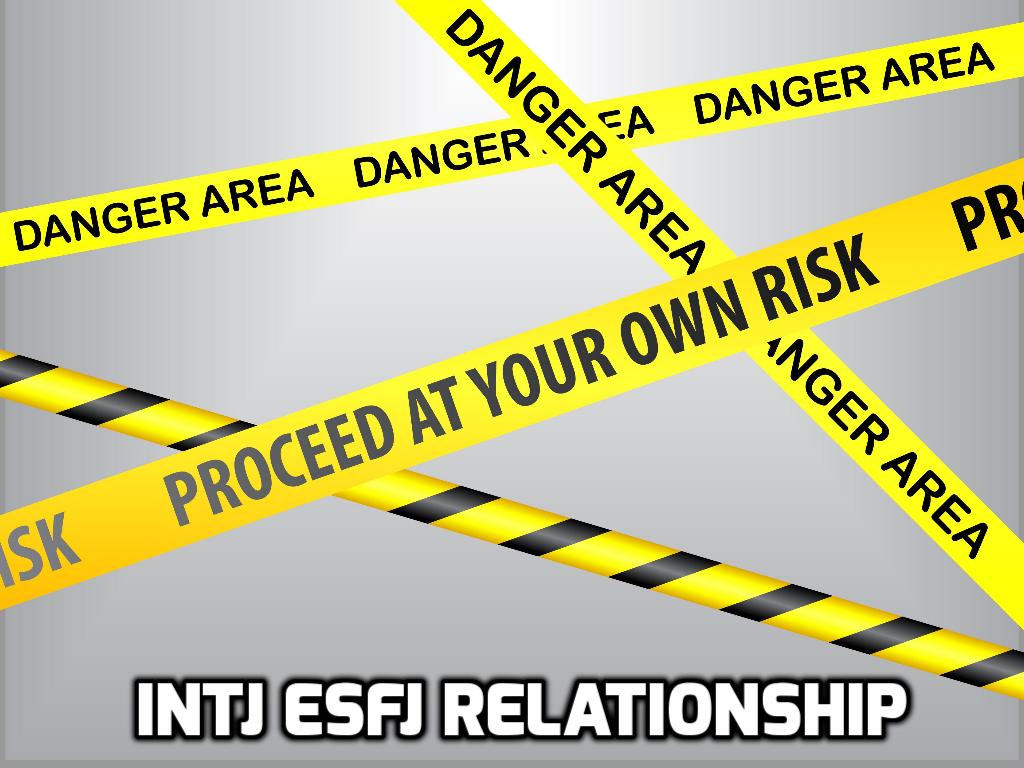A word of warning: be careful with ESFJs.
Extreme?
Perhaps. But this is the view of countless INTJs in their experiences with ESFJs.
Whether in relationships or at work, ESFJs are known for their deep incompatibility with INTJs.
But why?
INTJs and ESFJs have deeply different ways of looking at the world and their behavior is a function of this reality.
But let’s look at some of the important points regarding INTJ ESFJ relationships to see if we can gain a better understanding.
INTJ ESFJ relationships: The Good

(1) Let’s start with a tint of optimism.
For some INTJs their ESFJ partner can be fun-loving, optimistic and yet still serious. ESFJs are known for their bubbly personalities, always chatting and connecting with others.
INTJs can lead somewhat rigid and structured lives, sometimes causing them to feel bored.
The ESFJ’s often upbeat and dreamy attitude can bring some much-needed color into the sometimes pallid existence of an INTJ.
This dynamic could work very well to balance out some of the stronger preference traits in an INTJ personality type.
ESFJs are always letting others know they’re around and this could add a touch of togetherness which INTJs can lack at times.
Perhaps this is one of the stronger points in favor of an INTJ ESFJ relationship.
(2) ESFJs can be extremely caring by nature and can make others feel very warm and welcomed.
With strong maternal attributes, they are especially able to shower their loved ones with care and attention that can create a strong and lasting bond in a healthy relationship.
During your daily time together, your ESFJ personality type partner will usually chat with you and make you feel part of their world at all times.
You’ll know what they’re doing and they’ll take an active interest in what you’re doing.
At times during the INTJ ESFJ relationship, this can, without doubt, be endearing and warming.
However, INTJs need space, quiet solitude, where they can work in silence and think properly.
Constant chatter can be incredibly distracting and frustrating, especially when the INTJ has important work to do.
You’ll need to physically remove yourself from the environment or use something like earphones to show your ESFJ partner that you are not available to them at that moment.
Your ESFJ partner, of course, is not trying to bother you.
They only want to make you happy because they derive their happiness from making others happy.
INTJ ESFJ relationships: The Bad

(3) ESFJs have a strong inability to explain themselves and articulate their thoughts in a reasoned or articulate manner.
This causes frustration on two levels.
The ESFJ becomes frustrated at their lack of logical communication, which can cause resentment towards their INTJ partner due to the mismatch in intellectual cognitive function.
ESFJs prefer to feel and then articulate whereas INTJs prefer to think and reason before speaking.
The INTJ becomes tired because of the constant restraining of their ideas and speech and a feeling of “dumbing themselves down” often arises.
Often, ESFJs are accused of taking things personally and hearing what they want to hear, as opposed to what has actually been said.
All of these factors can come together to create a toxic communication environment.
(4) In an extremely positive way ESFJs can offset the natural Introversion of an INTJ well by introducing friends and social acquaintances to the INTJ’s life on a regular basis.
The INTJ partner could benefit from this ability to socialize with his or her socially adept ESFJ partner.
Yet it can be noted that the ESFJ is renowned for not discriminating in a healthy way against friendships where drama, gossiping and negativity are rampant.
Many INTJs have noted how seemingly nothing can be said to convince their ESFJ partner to drop some of their toxic friends.
Here we see an indicator of the wide gulf in perspective in an INTJ ESFJ relationship.
ESFJs love to be around people, almost regardless of whether the relationships are mutual beneficial.
INTJs take a different view and aim only to allow healthy and balanced people into their lives.
INTJ ESFJ relationships: The Ugly

(5) ESFJs are very capable and skilled at reading others’ emotions.
They thrive on emotional connections and reactions and expect others to show the same level of affection during an interaction.
They’ll even put the blame on others for their own negative feelings.
Here we encounter another fundamental difference in personality in the INTJ ESFJ relationship.
ESFJs need others to like them, and INTJs usually don’t care either way whether somebody likes them.
ESFJs are known for using their emotional abilities to manipulate others into getting what they want.
Often they’ll instill guilt into somebody in order to effect some end.
ESFJs can also use their emotional skills to create positive results and changes, which should also be noted.
(6) Another key difference is that ESFJs communicate using Extraverted Feeling and Intuition which makes little sense to INTJs.
This is because INTJ communication is Extraverted Thinking which is logic-based and comes from Introverted Intuition.
Essentially we are looking at a difference of minds with very little in common in terms of intellectual cognitive function.
The INTJ would find an intellectual outlet essential if he or she were to have a balanced life.
The lack of logical thinking and ability to engage in meaningful or intellectual conversation would mean the INTJ personality type would be living a life where he or she was not able to properly exercise their mind.
Fundamentally, ESFJs are interested in social interaction, people, and their relationships, whereas INTJs are interested in abstract ideas.
There is very little, intellectually, that both partners have in common in an ESFJ INTJ relationship.
INTJs naturally see the larger picture, while ESFJs see what’s around them in their immediate physical space.
Perhaps finding an intellectual outlet outside the relationship would be impossible for the INTJ too.
Prone to emotionalism, the ESFJ might find it too hard to allow the INTJ to look toward other people for what he or she needs.
This is an all-around unhealthy feature in any relationship, but especially in one with an INTJ where ample space is a key prerequisite.
What are your thoughts? Are you in a successful and thriving romantic relationship with an ESFJ? Share your comments below.

